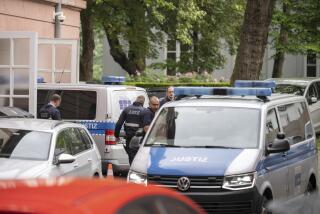EUROPE : Feeble Pursuit of Justice Still Divides Germany
- Share via
BERLIN — It was to be “one of the most spectacular criminal proceedings since the Nuremberg trials,” according to the newsmagazine Der Spiegel: the prosecution of East Germany’s last Communist leader, Egon Krenz, and five fellow members of the Politburo.
The six stand accused of manslaughter in connection with the killings of East Germans who tried to escape over the heavily fortified border between the former East and the former West.
Krenz and his Politburo colleagues are the most senior members of the East German elite still awaiting judgment in the German courts. For many, their convictions would bring a sense of closure to the painful era of German division.
Yet instead of becoming the 1995 equivalent of the Nuremberg war-crimes trials of Nazi leaders, the Krenz case may now simply peter out.
On the day the trial opened earlier this month, it was adjourned after three minutes when the defense successfully argued that the presiding judge, Hansgeorg Braeutigam, was prejudiced and should be replaced.
A substitute jurist took Braeutigam’s place. But no sooner did the trial resume than the prosecution pressed for a second delay, pointing out that there were not enough judges in reserve, and the trial was likely to be lengthy.
On Thursday, the court decided to move on, substitutes or no. Proceedings are scheduled to resume late next week.
But even if the Krenz trial unfolds without further procedural interruptions, many Germans doubt that justice will ever be served.
The age and health of the defendants are an unremitting problem for the prosecution. Two of the indicted are chronically ill and say they may not last the trial. (A seventh expected defendant died in June.)
But worse yet for the prosecution is the requirement that all former East German officials brought to book for political wrongdoing be shown to have broken the law of the German Democratic Republic (East Germany), a heavy burden of proof since many forms of repression were allowed by statute in the East.
Krenz and his fellow defendants argue that they were in the leadership of a sovereign state and thus were empowered to protect their sovereign borders by whatever means necessary.
The requirement to try East Germans according to East German law has already thwarted many German prosecutors.
Since unification, about 50,000 cases involving alleged Communist-era crimes have been opened. The simplest ones have generally gone to trial first, and even in these, judges have been able to reach only 180 verdicts.
Those convicted so far have tended to be people well removed from the inner circles of power. Some of these relative small-fry have received sentences of as long as 10 years.
But the people who dictated the sealing-off of East Germany in the first place--and who issued or sanctioned border guards’ shoot-to-kill orders--have largely evaded prison.
This record has left many Germans convinced that the courtroom is not the place to redress the wrongs of the East German elite.
More to Read
Sign up for Essential California
The most important California stories and recommendations in your inbox every morning.
You may occasionally receive promotional content from the Los Angeles Times.













